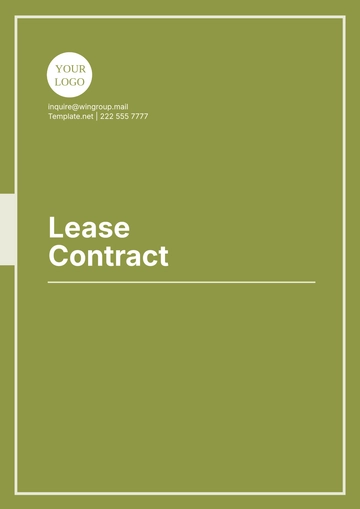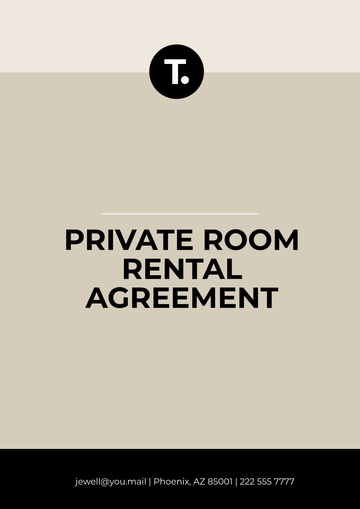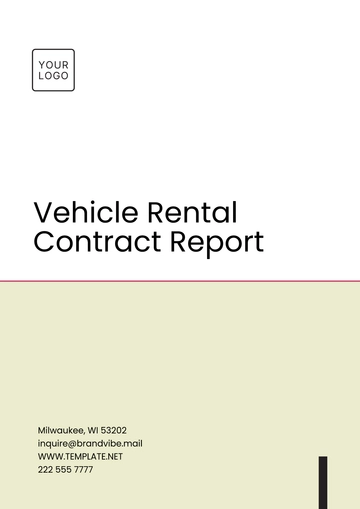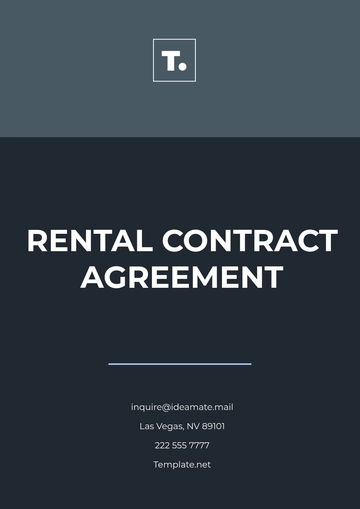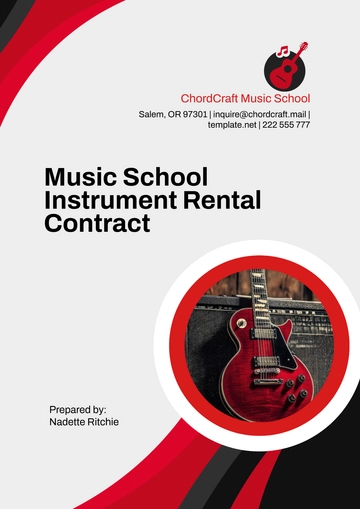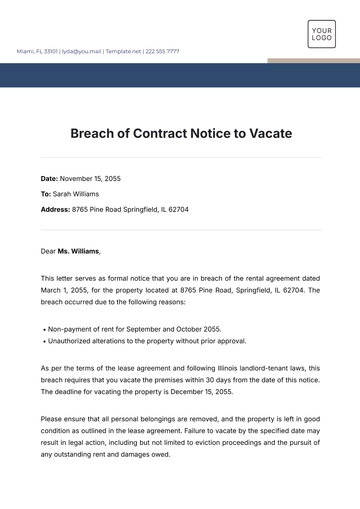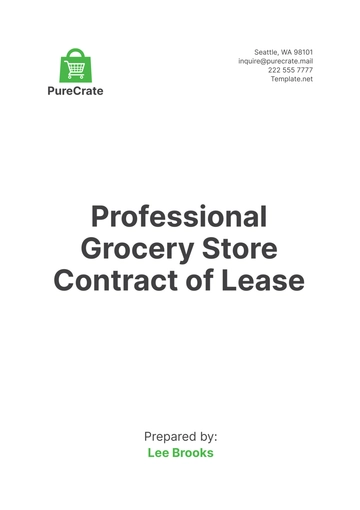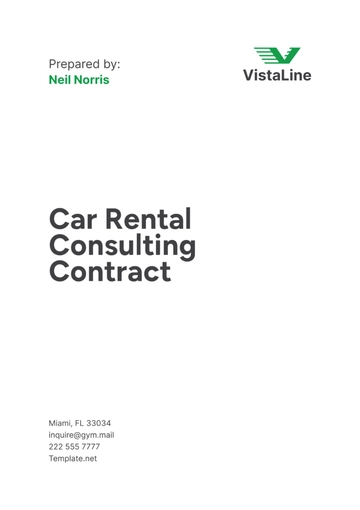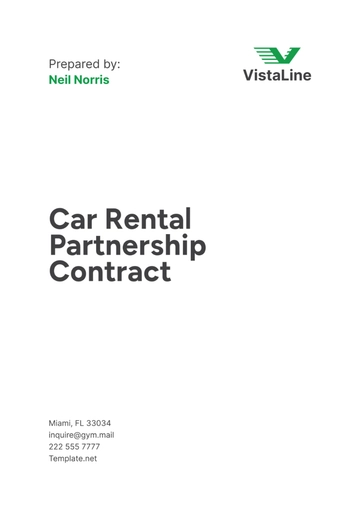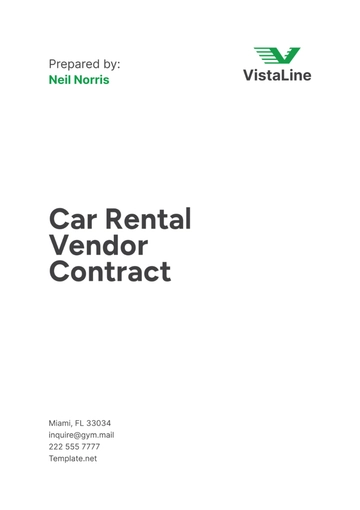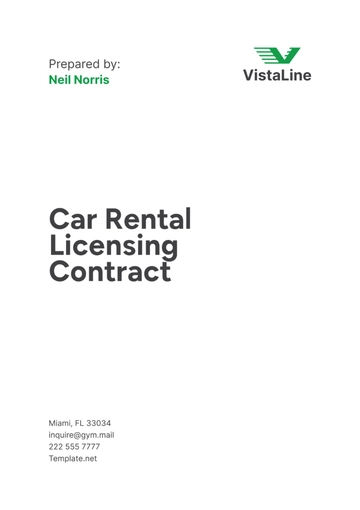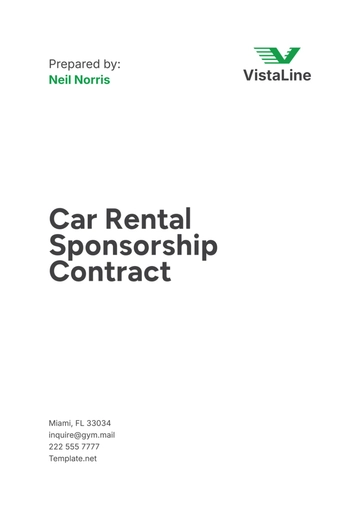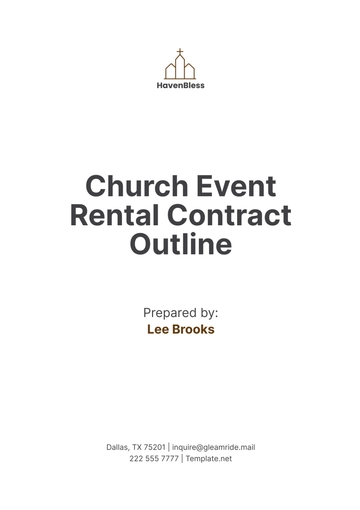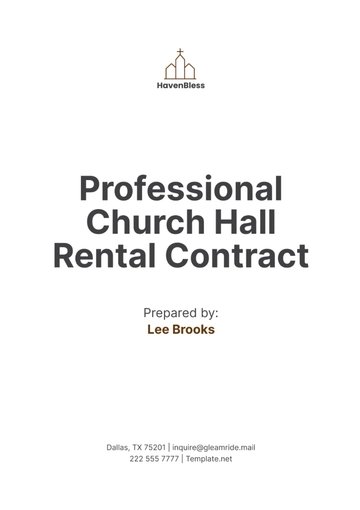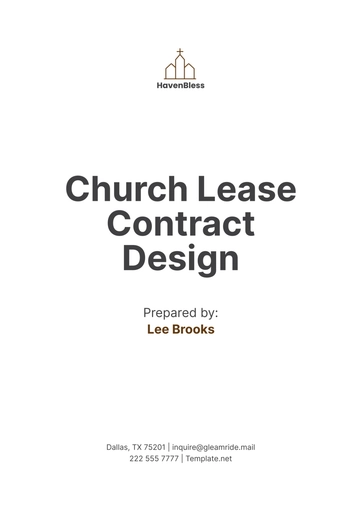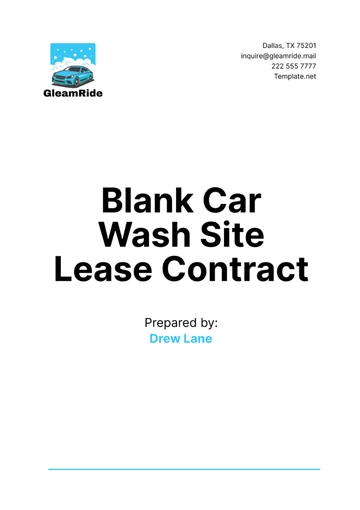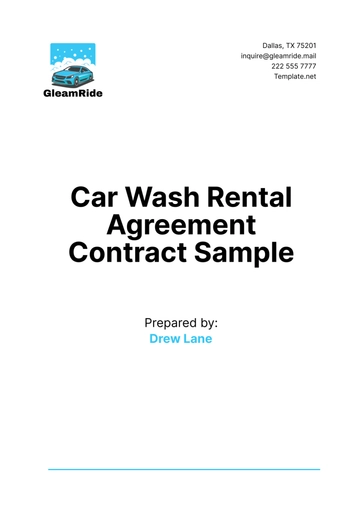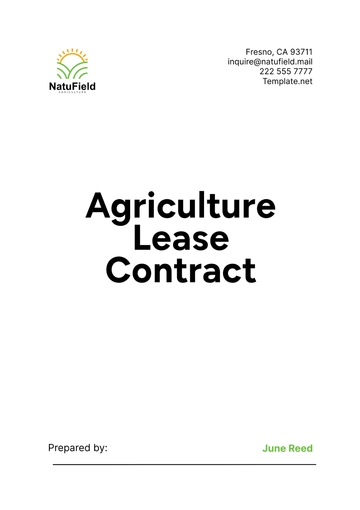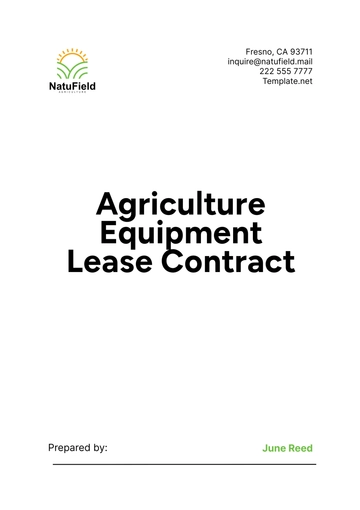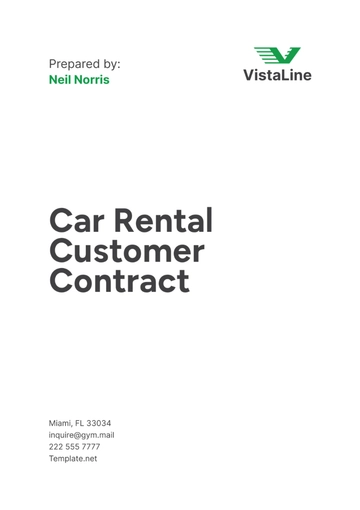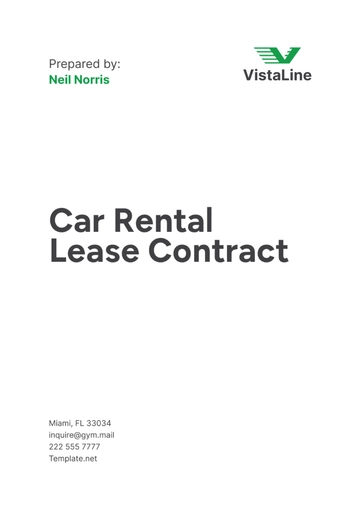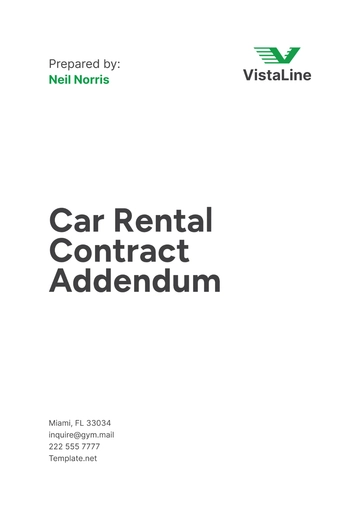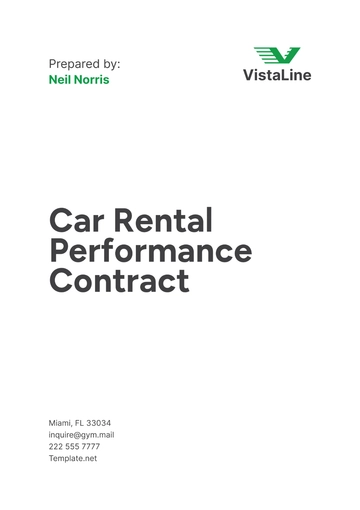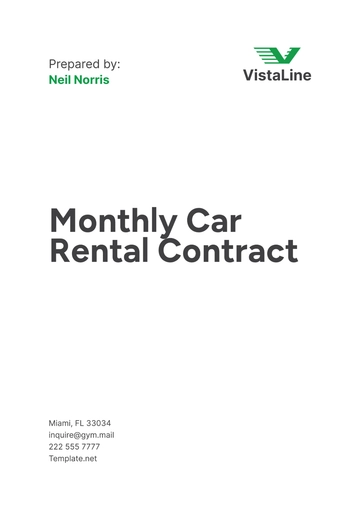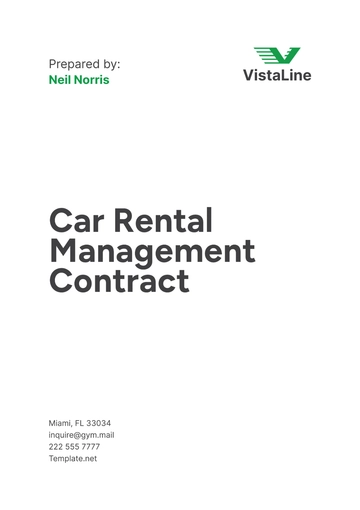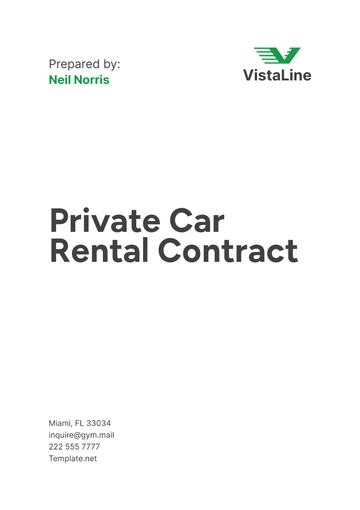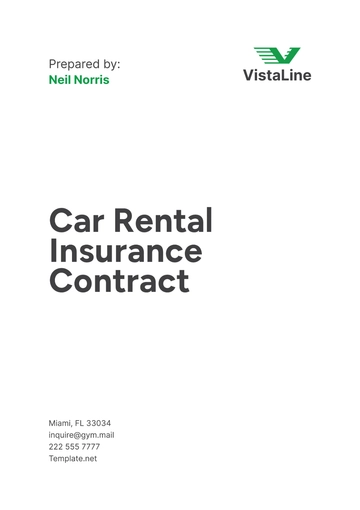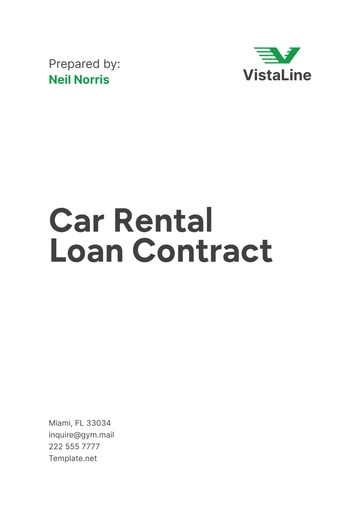Free Car Rental Management Contract
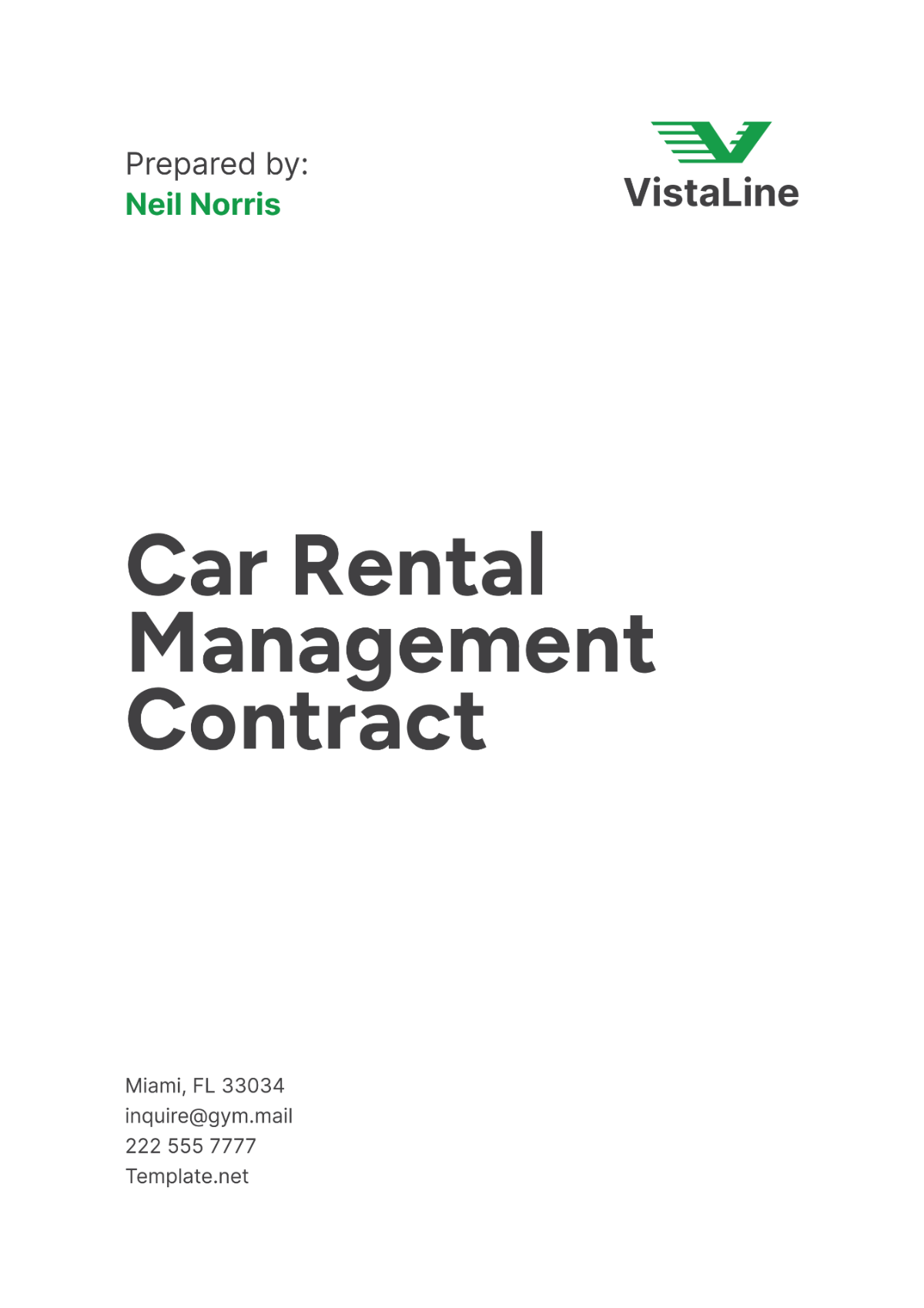
I. The Parties
This Car Rental Management Contract ("Contract") is made and entered into on [Month Day, Year] ("Effective Date") by and between [Your Company Name] hereinafter referred to as the ("Owner") with a primary place of business at [Your Company Address] and [Manager's Name] hereinafter referred to as the ("Manager") residing at [Manager's Address] collectively referred to as the ("Parties").
WHEREAS, the Owner owns and operates a car rental business;
WHEREAS, the Owner desires to hire a professional to manage the daily operations of said car rental business;
WHEREAS, the Manager has the expertise and experience required to manage the operations of the car rental business;
NOW THEREFORE, in consideration of the mutual covenants and promises contained herein, the Parties agree to the terms and conditions as follows:
II. Term of Agreement
A. Initial Term
Effective Date Commencement: The initial term of this Contract shall commence on the Effective Date and continue for a period of [1] year. This period is essential for establishing a stable working relationship.
Full Commitment: During the initial term, the Manager shall fully commit to upholding the responsibilities and duties outlined herein. This commitment is crucial for the smooth operation of the business.
Extension Agreement: Any extension of the initial term shall be mutually agreed upon by both Parties in writing. This ensures clarity and mutual consent for the continuation of the contract.
Performance Review: A review of the initial term performance will occur [3] months prior to expiry. This review will determine the effectiveness of the Manager’s performance and guide the decision on renewal.
Early Termination Notice: In case of early termination, a notice period of [30] days is required. This notice period allows for a smooth transition and minimizes operational disruptions.
B. Renewal
Renewal Terms: The contract may be renewed for additional [1] year terms upon written agreement of both Parties. Renewal terms will be based on the performance and mutual satisfaction of both Parties.
Renewal Review Meeting: A renewal review meeting will be scheduled at least [30] days before the expiration of the current term. This meeting will address any necessary changes or concerns.
Amendments Documentation: Any amendments or modifications to terms shall be documented prior to renewal. This ensures all changes are formally recognized and agreed upon.
Performance Metrics Evaluation: Performance metrics will be evaluated before offering renewal terms. Evaluating these metrics helps in assessing the Manager's effectiveness and areas for improvement.
III. Duties and Responsibilities
A. General Management
Daily Operations Oversight: The Manager is responsible for overseeing daily operations of the car rental business, ensuring smooth and efficient service. This includes managing customer interactions and addressing operational issues.
Inventory Maintenance: The Manager shall maintain inventory and availability of rental cars, ensuring vehicles are in a rentable condition. This involves regular maintenance and timely servicing of the fleet.
Policy Development: Develop and implement policies for rental procedures, customer service, and vehicle maintenance. Clear policies help in standardizing operations and ensuring consistency.
Customer Complaint Handling: The Manager shall handle customer complaints and provide resolutions in a timely manner. Effective complaint management enhances customer satisfaction and loyalty.
Monthly Performance Reports: Monthly performance reports shall be submitted to the Owner for review. These reports provide insights into the business performance and areas needing attention.
B. Financial Management
Budgeting and Planning: The Manager will be in charge of budgeting, financial planning, and ensuring profitability for the car rental business. Effective financial management ensures the business remains viable and profitable.
Contract Negotiations: Negotiate contracts with suppliers, insurance companies, and other service providers to optimize costs. This helps in reducing expenses and increasing profitability.
Payment Processing Oversight: Oversee payment processing, accounts payable, and accounts receivable. Accurate financial transactions are critical for maintaining the business's financial health.
Financial Record Maintenance: Maintain accurate financial records and prepare financial statements for Owner’s review. Proper record-keeping ensures transparency and accountability.
C. Staff Management
Hiring and Training: Hire, train, and supervise staff members to ensure high levels of service and professionalism. Skilled and well-trained staff contribute significantly to customer satisfaction.
Work Schedule Development: Develop work schedules, assign tasks, and monitor staff performance. Efficient scheduling and task assignment optimize staff productivity.
Regular Staff Meetings: Conduct regular staff meetings to communicate company policies, performance expectations, and other important information. These meetings ensure that all staff are aligned with the business objectives.
Staff Development Programs: Implement staff development programs and provide feedback regularly. Continuous development enhances staff skills and job satisfaction.
IV. Compensation
A. Salary
Annual Salary: The Manager shall be compensated with an annual salary of [$50,000.00]. This salary reflects the Manager's responsibilities and contribution to the business.
Bi-Weekly Payments: Salary payments will be disbursed [bi-weekly] through direct deposit to the Manager’s designated bank account. Regular payments ensure the Manager’s financial stability.
Annual Reviews: Annual salary reviews will occur each renewal period, with potential adjustments based on performance and company profitability. This incentivizes the Manager to perform well.
Bonus Criteria: Any bonuses or incentives shall be in addition to the base salary and will be determined by mutually agreed criteria. Bonuses provide additional motivation for exceptional performance.
B. Benefits
Health Insurance: The Manager shall be entitled to health insurance benefits fully paid by the Owner. Health benefits contribute to the Manager’s well-being and job satisfaction.
Paid Time Off: Paid time off shall accumulate at the rate of [15] days per year, pro-rated for partial years of service. Adequate time off helps in maintaining a healthy work-life balance.
Expense Reimbursement: Reimbursement for business expenses incurred by the Manager shall be provided, subject to Owner’s approval. This ensures that the Manager is not out-of-pocket for business-related costs.
C. Incentives
Annual Performance Bonus: The Manager may receive an annual performance bonus, up to [10]% of the annual salary, based on achieved targets. This rewards the Manager for meeting or exceeding performance goals.
Additional Incentives: Additional incentives may be awarded for exceptional performance and meeting key business objectives as determined by the Owner. Recognizing outstanding performance boosts morale.
Profit-Sharing Plan: A profit-sharing plan may be introduced subject to the profitability and growth of the car rental business. This aligns the Manager’s interests with the company’s financial success.
V. Confidentiality and Non-Compete
A. Confidential Information
Confidentiality Obligation: The Manager agrees to keep all business information, client data, financial records, and trade secrets confidential. Maintaining confidentiality is critical for protecting the company’s competitive advantage.
Survival of Obligation: This confidentiality obligation shall survive the termination or expiration of this Contract. The obligation extends beyond the contract term to ensure continued protection of sensitive information.
Legal Action: Unauthorized disclosure of confidential information may result in legal action and termination of the Contract. This clause deters potential breaches and protects the company’s interests.
B. Non-Compete
Non-Compete Duration: During the term of this Contract and for [2] years following its termination, the Manager shall not engage in any business that competes directly with the Owner’s car rental business. This clause protects the Owner from competition using insider knowledge.
Breach Consequences: If the Manager breaches this non-compete clause, the Owner may seek injunctive relief and damages. This provides a legal remedy to protect the Owner’s business interests.
Waiver of Terms: Non-compete terms may be waived only with prior written consent from the Owner. This allows for flexibility if circumstances change.
VI. Termination
A. Termination by Owner
Immediate Termination Grounds: The Owner may terminate the Contract with immediate effect if the Manager is found guilty of gross misconduct, fraud, or negligence. Immediate termination protects the business from harmful actions.
Breach of Contract: Termination can also occur if there is a breach of contract terms by the Manager which remains unresolved after a [30]-day remedial period. This gives the Manager an opportunity to correct the breach.
Return of Company Property: Upon termination, the Manager shall return all company property and confidential information without delay. Securing company property is essential after termination.
B. Termination by Manager
Notice Period: The Manager may terminate the Contract by providing a [60]-day written notice to the Owner. A notice period ensures a smooth transition and continuity of operations.
Completion of Pending Tasks: All pending tasks and obligations must be completed by the Manager before the termination effective date. Completing tasks ensures there are no disruptions in business operations.
Transition Assistance: The Manager shall aid in transitioning responsibilities to a successor designated by the Owner. This ensures that the business continues to operate smoothly during the transition period.
VII. Dispute Resolution
A. Mediation
Initial Dispute Resolution: In the case of any disputes arising from or related to this Contract, the Parties shall first attempt to resolve the dispute through mediation. Mediation provides a collaborative approach to resolving conflicts.
Mediator Selection: A neutral third-party mediator shall be mutually selected to facilitate the mediation process. An unbiased mediator helps in achieving a fair resolution.
Cost Sharing: All costs related to mediation shall be equally shared by both Parties unless otherwise agreed. Sharing costs ensures that both Parties are equally invested in finding a resolution.
B. Arbitration
Binding Arbitration Agreement: If mediation fails to resolve the dispute, the Parties agree to submit the dispute to binding arbitration. Arbitration provides a definitive resolution to conflicts.
Arbitrator Selection: An arbitrator shall be selected in accordance with the rules of the [American Arbitration Association]. Selecting a qualified arbitrator ensures a fair and knowledgeable decision.
Finality of Decisions: Arbitration decisions shall be final and enforceable in any court of competent jurisdiction. The finality of decisions provides closure to the dispute.
VIII. Indemnification
A. Indemnification by Manager
Manager’s Indemnification Obligation: The Manager agrees to indemnify and hold the Owner harmless from any claims, liabilities, damages, or expenses arising from the Manager's negligence or willful misconduct. This protects the Owner from potential losses caused by the Manager.
Legal Costs Inclusion: This indemnification shall include reasonable attorney fees and costs incurred by the Owner in defending any such claims. Including legal costs ensures that the Owner is not financially burdened by legal actions.
B. Indemnification by Owner
Owner’s Indemnification Obligation: The Owner agrees to indemnify and hold the Manager harmless from any claims, liabilities, damages, or expenses arising from the Owner's negligence or willful misconduct. This clause protects the Manager from potential losses caused by the Owner.
Legal Costs Inclusion: This indemnification shall include reasonable attorney fees and costs incurred by the Manager in defending any such claims. Including legal costs ensures that the Manager is not financially burdened by legal actions.
IX. Non-Compete Clause
A. Duration
Non-Compete Duration: The Manager agrees not to engage in any car rental business within a radius of [50] miles from the company's primary location for a period of [1] year following the termination of this Contract. This clause helps in preventing competition using insider knowledge.
Enforceability: This non-compete clause is enforceable to the fullest extent permitted by law. Ensuring enforceability protects the Owner's business interests.
B. Breach of Non-Compete
Liquidated Damages: In the event of a breach of this non-compete clause, the Manager agrees to pay liquidated damages equivalent to [6] months' salary. This provides a financial deterrent against breach.
Injunctive Relief: The Owner reserves the right to seek injunctive relief in the event of a breach of this provision. Injunctive relief helps in preventing further breaches.
X. Miscellaneous
A. Governing Law
Applicable Law: This Contract shall be governed by and construed in accordance with the laws of the state of [State Name]. Choosing applicable law provides legal clarity.
Jurisdiction: Any lawsuits arising from this Contract shall be filed in the appropriate courts of [State Name]. Specifying jurisdiction ensures that legal actions are taken in a known legal environment.
B. Entire Agreement
Comprehensive Agreement: This Contract constitutes the entire agreement between the Parties and supersedes all prior agreements or understandings. A comprehensive agreement ensures that all terms are clearly defined and agreed upon.
Amendment Requirements: Any amendments to this Contract must be in writing and signed by both Parties. This ensures that all changes are formally recognized and agreed upon.
C. Severability
Validity of Provisions: If any provision of this Contract is found to be invalid or unenforceable, the remaining provisions shall remain in full force and effect. This ensures that the Contract remains operational even if one part is invalid.
Replacement of Invalid Provision: The invalid or unenforceable provision shall be replaced by a provision that is valid and enforceable and comes closest to expressing the original intent of the Parties. This maintains the original intent of the Contract.
D. Notice
Notice Address: All notices under this Contract shall be sent to the addresses provided below or any other address designated in writing by either Party. Specifying notice addresses ensures that communications are directed correctly.
Delivery Method: Notices shall be delivered by certified mail, return receipt requested, or by a nationally recognized courier service. These delivery methods ensure that notices are received and acknowledged.
XI. Signatures
IN WITNESS WHEREOF, the Parties have executed this Contract as of the Effective Date.
Owner

[Authorized Representative Name]
[Your Company Name]
Date: [Month Day, Year]
Manager

[Manager's Name]
Date: [Month Day, Year]
- 100% Customizable, free editor
- Access 1 Million+ Templates, photo’s & graphics
- Download or share as a template
- Click and replace photos, graphics, text, backgrounds
- Resize, crop, AI write & more
- Access advanced editor
Our Car Rental Management Contract Template on Template.net is perfect for establishing clear terms! Editable fields and customizable design allow you to tailor the contract to your business needs. The AI Editor Tool aids in efficient contract creation, ensuring a professional and comprehensive management agreement tailored to your business' requirements!
You may also like
- Rental Contract
- Contractor Contract
- Contract Agreement
- One Page Contract
- School Contract
- Social Media Contract
- Service Contract
- Business Contract
- Restaurant Contract
- Marketing Contract
- Real Estate Contract
- IT Contract
- Cleaning Contract
- Property Contract
- Supplier Contract
- Partnership Contract
- Food Business Contract
- Construction Contract
- Employment Contract
- Investment Contract
- Project Contract
- Payment Contract
- Student Contract
- Travel Agency Contract
- Startup Contract
- Annual Maintenance Contract
- Employee Contract
- Gym Contract
- Event Planning Contract
- Personal Contract
- Nursing Home Contract
- Law Firm Contract
- Work from Home Contract
- Software Development Contract
- Maintenance Contract
- Music Contract
- Amendment Contract
- Band Contract
- DJ Contract
- University Contract
- Salon Contract
- Renovation Contract
- Photography Contract
- Lawn Care Contract
